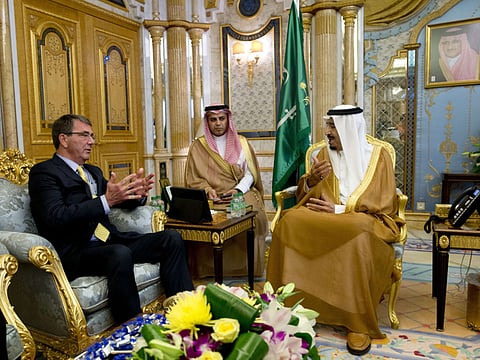Riyadh seeks US stand against Iran interference
Reassurance efforts may accelerate a deal for Riyadh to acquire the Terminal High-Altitude Area Defence system to counter Islamic republic’s missile capabilities

Jeddah: Saudi Arabia’s leaders sought assurances on Wednesday that the United States stands firmly against Iranian “interference” in the Middle East, during a visit by Defence Secretary Ashton Carter.
Carter arrived as part of a regional tour trying to allay the concerns of US allies that Iran could still be able to develop an atomic weapon despite an agreement reached this month between Tehran and six major powers led by Washington.
The US defence secretary met King Salman Abdul Aziz, then held talks with the king’s powerful son Deputy Crown Prince Mohammad Bin Salman, who is defence minister and second-in-line to the throne.
Gulf states are wary of the overtures to Tehran by Washington, their traditional defence partner.
Carter said ahead of his trip that he aimed to discuss American strategy to counter “Iranian aggression” in the region, as well as the fight against Daesh.
Officials say the talks will cover cooperation with Saudi Arabia in areas like missile defence and cyber and maritime security, although no new arms deals are expected.
Riyadh and its neighbours believe the deal will only embolden their regional rival, whom they accuse of meddling in Iraq, Syria, Lebanon and Yemen.
Anwar Eshki, chairman of the Jeddah-based Centre for Strategic and Legal Studies, said he believed Carter would try to “reassure the Gulf countries, and the kingdom especially, that the US will not allow Iran to carry out activities that will destabilise the Middle East.”
He said Saudi Arabia would talk about boosting its defences and “how to confront Iran” if destabilising actions increase as a result of the nuclear deal.
The deal would see Iran’s oil exports gradually resume and billions of dollars in frozen assets unblocked.
There are worries the Iran deal could spark a nuclear race in the Middle East.
Mustafa Alani, an Iraqi security analyst with close ties to Saudi Arabia’s Interior Ministry, said Gulf Arab states were concerned about Iranian missile capabilities and could discuss missile defence systems such as the Terminal High-Altitude Area Defence (THAAD).
One source familiar with the issue said US efforts to reassure Saudi Arabia after the Iran deal could accelerate a deal for Riyadh to acquire the THAAD system, but no announcement was expected during Carter’s visit.
Saudi Arabia had been expected to acquire a THAAD system in about two years, after a similar deal with Qatar. The UAE has already signed an agreement to buy the air and missile defence system.
Foreign Minister Adel Al Jubair last week warned Iran not to use the economic benefits of the nuclear agreement to fund “adventures in the region.”
If it does, “we’re committed to confront it resolutely,” said Jubeir, whose country is the world’s biggest oil exporter.
In June, France and Saudi Arabia announced a feasibility study for building two nuclear reactors in the kingdom.
Saudi Arabia has also reached accords this year with Russia and South Korea on the peaceful use of nuclear energy.
Along with its own nuclear projects, Riyadh is building alliances beyond its ties with Washington in order to counter Tehran, under a more assertive foreign policy adopted since King Salman acceded to the throne in January.
Two months later, the kingdom organised an Arab coalition to conduct air strikes against Iran-backed rebels seizing territory in neighbouring Yemen.
The US has provided aerial refuelling, intelligence and other assistance to that Saudi-led alliance.
“There was a difficult situation in Yemen,” Salman told Carter, apologising that he could not attend a May summit with President Barack Obama in Washington.
Since late last year, Saudi Arabia has also been part of a US-led coalition bombing Daesh (the self-proclaimed Islamic State of Iraq and the Levant) which has occupied large parts of Iraq and Syria.
The group has committed widespread atrocities there and inspired attacks around the world, including in Saudi Arabia.
Carter is trying to respond to regional concerns about Iran by proposing intensified military cooperation with its longtime allies.
With the Saudis, there will be talk of training special forces, cyber security, anti-missile defence and other issues, a US defence official said.
Carter is to return mid-afternoon to Jordan, another member of the anti-Daesh coalition.
On Tuesday, he told coalition military personnel at a Jordanian air base that the US and Israel had a “common commitment to countering Iranian malign influence in the region”.
Sign up for the Daily Briefing
Get the latest news and updates straight to your inbox



